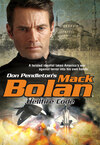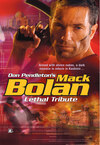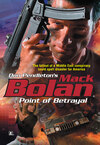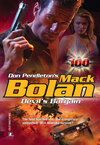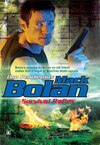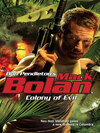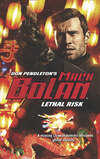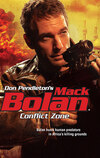Kitabı oku: «Hellfire Code», sayfa 3
“So, we finally meet face-to-face,” Downing said with a deep sigh. “What a moment, yes?”
“I’m thrilled to be here for it,” Neely said drolly. He cast another suspicious glance over his shoulder.
“You’ve been a great service to us, Mr. Neely,” Downing said. “I do hope we can count on your continued cooperation.”
“Do I have a choice?”
“Oh, come now. Your NSA file suggests you’re quite the patriot. I’m positive you would want to further show your support if you better understood our mission and goals.”
“What I understand is thirteen dead people who should still be alive,” Neely said. “Somehow, I don’t think much else matters when you go around wasting kids and grandmothers.”
Downing shook his head with sadness. “We were just speaking of this. It was not my desire that innocent people suffer. It was an unfortunate accident. But in war we must accept the fact that innocent lives can and often are lost, that casualties are a consequence to both sides, and we must come to terms with that fact.”
Neely’s smile lacked warmth. “We’re not at war, Downing.”
“Oh, but we are,” Downing replied. He rose and went to the small window overlooking the street below the three-story building. “In fact, we’ve been at war for some time now. We declared that war when the terrorists chose to attack us on our own soil. Even before that, I’m afraid.”
He turned to look at Neely, folded his arms. “You see, we’d been battling terrorism for years. You know the history of our secret societies. Of course, we’d done a good part of it behind the backs of our fellow citizens, but that was only so we could protect them from the horrors of our war. And yet after all this time, how far have we really come? I ask you, Mr. Neely, how much closer are we to victory? So we’ve overthrown a dictator here and there, kept one or two network cell leaders on the run. But what real benefit has this reaped for us? Nothing.
“Our people continue to live in fear, and we still issue regular high-level alerts for terrorist threats. We scan air and sea alike for any danger, search our people at airports and train stations and bus depots without evidence of wrongdoing. We detain citizens at border checkpoints, thereby restricting freedom of movement. And what I find most detestable is that we permit our government, under the guise of that ridiculous and unconstitutional Patriot Act, to impose any sort of order it sees. Washington bureaucrats continue to operate unchallenged and unchecked, Mr. Neely, and good Americans continue to die. So while we do what we think needs to be done to stop terrorism, groups like the New Corsican Front are smuggling in an army of devils right under our very noses. And what do we do about it? Again nothing!”
“And you plan to change that?”
“We’ve already changed it,” Stezhnya barked.
Downing nodded with a smug and satisfactory expression. “Alek is correct. The New Corsican Front lost thirteen of their men in our operation in Atlanta. That’s thirteen who won’t threaten our country with suicide bombs. Thirteen who won’t shoot or blow up any American children tonight. Thirteen who won’t hijack any planes or kill any service people in defense of some outdated religious ideology.”
Neely’s sneered. “That’s also seven people who won’t watch their sons and daughters graduate high school, or spend Christmas with their families. Seven people who won’t kiss their children good-night. Seven people who won’t attend church this Sunday. Doesn’t sound like much to be proud of.”
“So, you’re not going to let go of that,” Downing said. “I see. That’s too bad, Mr. Neely, because I had big plans for you.”
“Really.”
“Indeed. You’re well respected in the intelligence community, with many good connections. You could probably provide me with significant information. At best, you could identify the individual who keeps meddling into these affairs.”
“I’ve already told you, I don’t know who he is,” Neely protested. “He uses the name Matt Cooper, but it’s an alias and not one I can find in any of our systems. He’s probably some kind of black ops. We were friends…sort of. But I’m sure by now he knows I betrayed him. Plus, I don’t know how much more use I could be to you. Somebody was following me.”
Downing could see Stezhnya become immediately alert. “Who followed you?”
“Don’t worry,” Neely said. He waved it away. “I made sure to lose him well before I got here. But I don’t know who he is. I’m assuming he’s either with the NSA or a Company man.”
Downing looked at Stezhnya and frowned. “You need to take care of that.”
“Yes, sir,” Stezhnya replied.
“Now just wait a goddamned minute,” Neely cut in. “Don’t start going around killing our spooks, or you’re going to bring a whole shitload of people down on your operations here, and I’m sure you’re anxious to avoid that kind of attention. Besides, this guy isn’t important enough to worry about.”
“What makes you think so?” Stezhnya asked.
Neely looked at the man and expressed incredulity. “What are you, some sort of ignoramus? If he knew anything about you two, he wouldn’t have been assigned to watch me. You go and off the guy, you’re just proving to whoever he’s working for that there’s something to have them concerned. That’ll just send a message they need to come down and look at things more closely.”
Neely looked at Downing and pleaded, “That’s why you should forget about me. I’m no more good to you, because I don’t know anything else. I just want to be left alone. If I don’t do anything to arouse this guy’s suspicions, then that should be enough to throw him off your trail.”
Downing studied Neely for nearly a minute, looked for deception. He had to admit Neely was right. Their work sat at a critical juncture, and he didn’t want to call unnecessary attention to this area. The Philippines were his central base of operations. He couldn’t afford to have soldiers of the same side scrutinizing this part of the country too closely. Up until now he had the luxury of operating in secret, and when he was so close to the goal he needed to maintain the status quo.
“Okay, Mr. Neely, what you say makes sense,” Downing said. “For now, you’re free to go. But don’t make any attempt to contact this man or do anything foolish.”
“Fine,” Neely replied. As he rose from his chair and headed for the door, he added, “Just try not to kill any more noncombatants. Okay? I don’t like being a participant to murder.”
Something turned cold in Downing’s otherwise impassive expression. “I don’t like to brag, Mr. Neely, but we’re just getting started. Part of this operation was a way of raising support for the OSI, to be sure, but we’ve only scratched the surface. Before all is said and done we’re going to show the world we take care of our own, and in so doing will send the terrorists a message.”
“Oh, yeah?” Neely scoffed. “And what kind of a message is that? Your wanton disregard for human life?”
“Not at all,” Downing replied. “We’re going to demonstrate what kind of trouble they’ve bought themselves for threatening the peace and stability of America. In just a short time, we’re going to bring hell itself to them.”
CHAPTER FOUR
Mack Bolan couldn’t be sure if he or Peter Hagen had been the target, although it hardly mattered at this point. Rain and plaster chips rained on him from the fractured ceiling. The soldier choked back a cough. He couldn’t allow himself to succumb to the dust-thickened air as long as the threat remained.
Bolan watched bullets dance across a nearby wall. China inside a cedar cabinet burst under their impact. The rounds shattered the glass in the doors and ripped massive gouges in the antique wood. A bullet trail stitched the wall and headed directly for Lupe, who now stood in the entryway of the den and screamed in horror at the sight of Hagen’s torn and broken body. Bolan leaped to his feet and threw his body toward Lupe, tackling the maid as a continuous stream of autofire buzzed the air where she’d stood a millisecond earlier. They hit the ground hard and the impact knocked the wind from the woman.
Bolan ordered her to keep her head down, drew and primed the Beretta, then crawled to the front door. He reached up, yanked on the latch-style handle, and opened the door wide enough to crawl onto the porch. The soldier rolled into the L-shaped hedge for cover, then risked a glance over the top.
A dark sedan sat parked at the curb and three men dressed in black stood in a line just outside its open doors. Bolan watched as they ceased firing their Uzi submachine guns and took a moment to reload. The Executioner seized the advantage in the lull. He pushed his body beneath the base of the hedge and came out the opposite side with a perfect field of fire on the enemy. He aligned his sights on the nearest target and squeezed the trigger. The single 9 mm Parabellum round took the man in the face. The impact spun the gunner and slammed him into the open door.
The other pair was still trying to reload while frantically searching for Bolan. One man reached down to grab his deceased comrade and drag him inside the sedan while the second guy fumbled with a fresh magazine. Bolan decided to change tactics, to prevent the enemy’s escape. He realigned his pistol sights on the driver’s side of the front windshield and pumped two slugs into it. The driver’s skull exploded into a gory mess under the Executioner’s skilled marksmanship.
Bolan returned his attention to the more immediate threat, which had now identified his position and was swinging an Uzi in his direction. The soldier thumbed the selector switch to 3-shot mode, snap-aimed and squeezed the trigger. The trio of 9 mm stingers struck groin, stomach and chest. The man dropped his weapon and grabbed at his stomach. His body pitched forward a moment later and landed prone on the wet lawn.
The remaining gunner had the body of one of his cohorts halfway inside the sedan when he saw the second man fall. Obviously he realized self-preservation was his only remaining option, so he quickly dived into the front seat and crawled to the driver’s side. Bolan climbed to his feet and sprinted toward the sedan as the surviving gunner fought with the deadweight of the body behind the wheel. The engine suddenly roared to life. Tires spun on the slick pavement as the sedan rocketed away from the curb.
Bolan changed direction and headed for his own car. He figured if he played his cards right, the guy would try to return to the safety of his own kind, and that meant he’d lead the Executioner right to the answers.
Bolan jumped behind the wheel, started the engine and gave chase to the fleeing sedan. He didn’t know exactly where it would all lead him, but he was desperate for answers. The enemy had been onto him since his arrival in Atlanta, and perhaps even before that. He didn’t like the thought that Roger Neely had betrayed him, but there was no other reasonable explanation. Few people outside of Stony Man should have known of any connection between what had happened in Atlanta and Dr. Peter Hagen. The only other people who would have that kind of information were Downing and any people he had on the inside.
What Bolan couldn’t help but wonder was if he had been the one to lead them to Hagen. He had made damn sure nobody followed him before he contacted the scientist, but it was possible he could have missed them. And if he hadn’t led them to Hagen, then why did they wait until Bolan was there before making the hit? Had they hoped to kill them both and somehow sow a disinformation campaign that would tie things up and leave Downing smelling rosy clean? That didn’t make much sense, since Downing had already claimed full responsibility for the operation in that slum neighborhood.
Well, he could figure it out later. For the moment the Executioner knew he had to keep his focus on the mission at hand. He stayed back far enough not to spook his quarry. Bolan had felt uneasy about leaving Lupe behind to contend with the mess there, but he didn’t think she was in any further danger. Whoever was behind this hit had probably accomplished what they went there to accomplish: the assassination of Peter Hagen. Bolan wasn’t buying the hit team had been there for him. There was something else going on here, something deeper and more insidious.
The sedan left Brookhaven city limits and merged onto the highway, heading toward Atlanta. It was possible the driver had a ruse in mind, but somehow Bolan didn’t think so. Unless the hit team had observed him park his vehicle, they wouldn’t know he had transportation close by. In all probability, the driver would think he’d gotten away clean. At most, he’d be looking for marked police units that might have a description of his car. That would have him a little paranoid and thus less watchful of civilian vehicles.
They continued along the highway until they entered the city, and soon the sedan took a north side exit. Bolan continued to follow at a relatively neutral distance. He reached into the bag sitting next to him and pulled out a Fabrique Nationale Herstal FNC compact assault rifle. The FN-FNC was as versatile and dependable as the acclaimed FAL. However it chambered the 5.56 mm round, the most popular high-velocity slug in use by military units around the world. At a cyclic rate of 800 rounds per minute, the weapon had become a trusted ally in Bolan’s war and he often included it in his basic mission arsenal.
Bolan was checking the weapon to ensure he was ready for action when the sedan’s brake lights caught his attention. The vehicle made a sharp turn onto a side street between a pair of large, abandoned buildings. He noticed they had entered a rundown industrial area, and most of the businesses were either closed or abandoned. It seemed like a strange place to set up shop, but Bolan could see where it might prove the perfect place to hide something—something like an elite hit team.
The Executioner increased speed and prepared for action.
THE SOUND OF TIRES crunching gravel and skidding to a halt brought Lyle Prichard to the steel hopper window of the old warehouse. This whole deal had him a bit jumpy. He hadn’t been very keen on the idea of maintaining this ridiculous vigil from the moment Alek Stezhnya had ordered it, and now they had company. He checked his watch and hoped it was Galeton and the crew returning from Hagen’s place. They were already an hour overdue.
Prichard looked through the slightly open window to stare at the alleyway below and confirmed it was the sedan. It was about damn time. Now maybe they could get the hell out of here. After their operation in Atlanta, Stezhnya had insisted on returning to headquarters in the Philippines and leaving him in charge to complete their operations. Hagen had remained the one loose end in their business here in the States, and apparently Garrett Downing didn’t like loose ends. Assuming Galeton and the crew had done their job, they could now report the mission completed and return to the temporary training grounds south of Milan.
Prichard turned from the window and looked at Mick Tufino. The Italian’s feet were propped on a plain, metal table. A half-smoked cigarette dangled from his mouth while he flipped through a Hustler magazine.
“They’re back,” Prichard said.
“That’s nice.” Tufino grunted.
“For chrissake, put that down and start getting our gear together, Mick,” Prichard said. He flipped open his cellular phone with a snap of his wrist. “I’ll call the boss and let him know we’re ready to extract.”
Tufino sent Prichard a flat look before tossing the magazine aside and getting to his feet. He went to the bags stacked nearby and began to inventory their equipment. Two of the bags contained an assorted cache of automatic weapons, including four M-16 A-3 carbines, four MP-5 subguns, and a pair of HK 33Es. Another bag held most of Tufino’s demolitions. He’d packed twenty-five, one-pound sticks of C-4 plastique, an equivalent number of detonators, plus some standard GI-issue M-1 fuse igniters. They hadn’t needed any of it for these missions, but Tufino didn’t like to be shorthanded and Prichard could appreciate that. It was good to have such supplies in a pinch.
Prichard heard the door on the first floor roll open, and then a set of footsteps rapidly ascend the stairs. He furrowed his eyebrows at that. There should have been four men coming up the steps, and to hear one set of footfalls seemed a bit odd. Maybe the rest had waited in the sedan, but that didn’t make much sense. He and Tufino sure as hell weren’t going to carry all this equipment down the steps themselves.
A moment later Galeton’s head popped into view followed by the rest of his lanky form. The color of his skin was visible from across the room even in the dim light afforded by the two of at least a dozen overhead lights, the only ones actually working. Prichard had never seen Galeton look so ghastly and haggard.
“What—?” Prichard began.
“We’ve got problems!” Galeton called.
“That’s not what I want to hear right now,” Prichard said as he looked in Tufino’s direction with a measure of panic.
“What kind of problems?” Tufino asked.
“Somebody beat us to Hagen,” Galeton replied.
“Okay, so where’s the rest of the crew?” Prichard asked.
“Dead,” Galeton said.
As Galeton came close Prichard could see his comrade was visibly shaken.
“What?” Tufino rasped.
“I’m serious,” Galeton said with a nod. “I think it was that Cooper guy Stezhnya said we should watch for.”
“Stezhnya also told us he’d be taken care of,” Tufino said, the anger evident in his voice.
“Well, obviously he was wrong,” Galeton replied harshly.
Before Prichard could comment further, the sound of another vehicle approaching echoed through the deserted factory building. Prichard spun on his heel and dashed to the window. A plain, unmarked car slowed to a halt behind their rented sedan. Prichard watched a moment longer and saw a lone, tall driver in casual dress exit the vehicle. He held the thin, unmistakable silhouette of an assault weapon tightly against his muscular form.
Prichard stepped from the window and gestured for Tufino to pull weapons from their stash. Galeton tossed the Uzi at Tufino who traded it for one of the MP-5s. Tufino then withdrew a pair of the M-16 A-3s. Prichard yanked the .45-caliber Detonics from his shoulder holster, jacked the slide, then holstered it and took one of the M-16s from Tufino. The three men fanned out, each toward a point of cover that would also facilitate interlocking fields of fire.
According to the intelligence Stezhnya had given them, Cooper was some type of secret operative. They didn’t know much more about him than that, and apparently even all of Downing’s connections had come up with zilch on the guy. This Cooper apparently had no registered face, no identity, not even a set of fingerprints. Evidence suggested he’d probably engaged in other special operations, but where or when those operations had taken place, and what authority had sanctioned them, remained a mystery.
Prichard only hoped he wasn’t a cop. He didn’t care for killing cops if there was some way out of it.
“We take him alive if we can,” Prichard whispered to the others. “Shoot to wound.”
The men grunted their assent, then fell silent to wait.
WHEN BOLAN EXITED the vehicle, he studied the massive sliding door that stood open just wide enough to squeeze through. He then looked up and saw dim lighting through the third-story hopper windows, one of which was ajar, and human shadows on the ceiling that moved with frenetic pace. Obviously the occupants had seen him and were now scrambling to set up an ambush.
The optimal plan at this point was to find another way into the rundown factory. If all else failed, then he’d have to try for a frontal assault, but Bolan wasn’t feeling particularly suicidal at the moment.
Bolan sprinted the length of the factory and rounded the far corner. He stopped and looked up to find a fire escape. It was rusted with age but appeared more than adequate to hold his weight. He searched the area and quickly spotted a large garbage bin nearby. He trotted to it, pushed his weight against it and smiled with satisfaction when it gave under a test push. The wheels groaned and squeaked under protest as Bolan shoved it into position beneath the fire escape. He slung his FNC, then leaped nimbly onto the lip of the bin. He jumped up and reached the bottom rung of the fire escape. Muscles tensed as he pulled his weight up through the narrow opening and into a seated position on the grated walkway.
Bolan catfooted up the steps until he reached the third story. He found the door ajar, which didn’t surprise him. The building was abandoned, a number of its windows broken. It was little more than a shell that its owners had left to its own fate long ago, which meant nobody would care who entered.
The soldier slipped through the door and crouched. No sounds greeted him, and he wondered for a moment if he’d been duped into a well-laid trap. Then he heard the slightest movement, just a shuffle of feet, and it told him he was close. One of the ambushers was becoming impatient. That was good. It would give Bolan a point of reference; determine the location of his enemy and perhaps their numbers.
The Executioner felt his way through the pitch-black hallway and carefully placed each step. It wouldn’t do to let them hear him before he was in a position where he felt he held the advantage. Bolan continued his slow, agonizing journey but eventually the sight of two men crouched behind large wooden crates rewarded him. He couldn’t see their faces, but a cursory inspection was enough to tell him neither was the man driving the luxury sedan he’d followed here. The closer gunner was black and the other, swarthy and dark-haired. Bolan made the latter for Greek, maybe Italian. Since neither matched the description of the sedan driver, he knew at least three lay in wait for him.
Bolan stepped from the shadows and leveled his weapon at the black man. “Don’t move,” he commanded in an icy tone. The other man started to shift and he added, “Either of you. You’re not that fast.”
“Looks like you got the drop on us, my friend,” the black man said.
“I’m not your friend,” Bolan said. He directed his voice toward the general direction of the loft and called, “Whoever else is waiting, you might as well show yourself!”
The hesitant sound of quickened breathing, the creaks in the floor as someone shifted weight on his feet, and the enemy appeared to Bolan’s left in a swift and sudden blaze of autofire. It was the sedan driver, and he made a beeline for another piece of cover, tried to flank Bolan with a suppressing volley. The Executioner swung the muzzle of his weapon with practiced ease and held back the trigger on a long burst as he led the target just slightly. The man stepped right into the path of Bolan’s fire, and the 5.56 mm slugs ripped an ugly pattern in his chest. He spun from the impact and skidded along the dusty floor.
The other pair seized the attempted distraction of their cohort’s sacrifice, but as Bolan had previous alluded, they weren’t that fast. The soldier hit the floor, and twin bursts of slugs from the M-16 carbines zinged well over his head. He answered the assault with a blinding one of his own, the slugs hammering away at the targets. The first shots took the black man full-force in the gut and slammed him into the crate he’d been using for cover. Bolan’s second burst caught the survivor in the thigh and grazed his right midriff. He shouted in pain, released his weapon and sat back on his haunches as the carbine clattered to the floor.
Bolan crossed the expanse in seconds and kicked the weapon well out of reach. He then moved close enough to see that the man was badly wounded, perhaps fatally if they didn’t do something to stop the spurting blood from his leg wound.
“You got a medical kit?” Bolan asked.
The man still seemed in shock as he nodded and pointed in the direction of several large bags. Bolan dug through the weapons and found a large red case that contained bulky field dressings. He moved quickly with the entire pack, knelt at the wounded man’s side and expertly stripped one of the dressings and applied it. He then tore a long strip from a roll of gauze wrapping, folded it in two and quickly applied it to the bandage. That accomplished, he tore a second strip and after thumbing rounds from one of the clips for the Beretta, used it to twist the bandage tightly enough to provide a makeshift tourniquet.
“That should hold,” Bolan said. He looked into the man’s eyes, which were rapidly going dim. A second glance revealed blood seeping to the surface of the thick bandage.
The man looked at him and grimaced with pain. “Maybe not.”
They both knew it at that point.
“You know,” the guy continued, “we had you figured all wrong, Cooper. They led us to believe you were one of the bad guys. I’m thinking now maybe we were the bad guys.”
“Yeah,” Bolan replied quietly. “Maybe so.”
“You won this round,” the guy said, the tone in his voice even weaker. The light began to leave his eyes.
“The innocents killed last night. Your men did it?”
“Yeah,” he replied. “But they ain’t my men.”
“Who gave the orders?” Bolan pressed. “Downing?”
The man seemed to have only enough strength now to nod. He coughed—although to Bolan it seemed more like a ragged exhalation—but then said, “You’re a decent man, Cooper. For patching me…up…I mean…”
“Do something decent in return,” Bolan said. “Tell me where I can find him. Where can I find Downing?”
Before he died, the guy managed to rasp, “Manila.”
